ITB Hospitality Day 2014: Online panel recommends control of channels
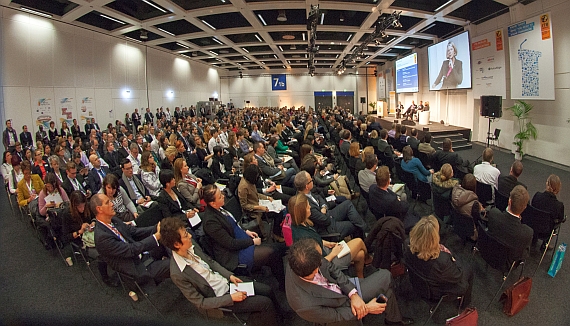 |
|
| Online distribution fascinates the industry: Everybody loves to know where to spend money. The audience at the ITB Hospitality Day 2014. / photos: ostwestfoto |
Berlin (April 4, 2014). How much business comes through the website? That was the central question posed to participants at the talk round on online distribution during the 9th hotel conference at the ITB Berlin. The result was a lively and self-critical talk round on the challenges of online distribution, from the perspective of both the OTA and of the hotelier. The participants: representatives of Marriott Hotels, Ringhotels, VIR/Verband Internet Reisevertrieb (association internet travel distribution) and a pricing advisor.
As in previous years, moderator Carolin Brauer, Managing Director of the consultancy Quality Reservations in Langenhagen near Hanover, attempted to bring out the differences of opinion with calm, concentrated questions. Hoteliers taking part in the talk round and Susanne Weiss from the medium-sized Ringhotels consortium pointed out that in 2007, 10% of reservations still came through the call centre, whereas today, this was only three to four percent. At present, 80% of reservations are made online, and 20% directly.
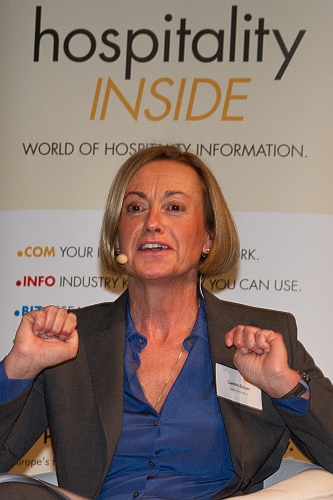 |
|
| Moderator Carolin Brauer. |
At Marriott International, a global chain with much higher booking volumes, Alexander Pyhan, Sr. Director, Global eCommerce Channels, reported that up to 40% of room revenues were generated through the chain's own distribution channels, whilst 25% came through GDS due to corporate business and almost a touch more (25-30%) came through the call centre - due to the strong customer loyalty programme "Marriott Rewards". At 40%, the conversion rate through the call centre was still considerably higher than online, Pyhan went on. Up to 80% of bookings came through the company's own website marriott.com - and this is to be maintained in future.
Value-for-money stimulates willingness to pay
Michael Buller, Chairman of VIR admitted that the big brands have it easier than the small ones. From the perspective of the OTAs, he said that these would also see themselves as a brand (for the hotel sector) and that Expedia, for example, meanwhile spent 45% of profits on marketing.
Airlines can only dream of such high direct booking figures, as pricing expert Dr Mark Friesen from Quinta Consulting made clear. In terms of hotel rates, he identified a clear trend towards discounts: "If the special rate is the normal rate, that's bad." For him, focus on rate falls much too short.
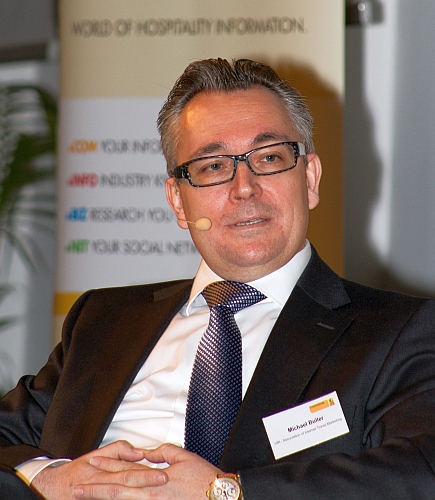 |
|
| OTA representative Michael Buller of VIR. |
Buller said here concretely: hoteliers don't even have their room categories clear, as a result, the sale can only end in terms of price. The OTAs and their systems were provided with poor information from hotels - and for this reason it's the case that for the OTAs today, it's no longer price, but value-for-money that counts. Pricing expert Mark Friesen defined value-for-money as the customer's willingness to pay, which must be explored.
"The customer no longer has an anchor from price," Ringhotels Chief Susanne Weiss said self-critically. "And we have destroyed this ourselves." Friese confirmed: "The confused customer doesn't buy anything." He advised the hotel industry to look at the value model used in the automobile industry.
Marriott recommended a distribution strategy and a mix of channels: "You don't have to work with every distribution channel though," he concluded. The chain selects third parties (OTAs) very carefully, and the important thing is to monitor these distribution partner.
Hoteliers can't do "simple"
Since rate parity has gone, at least in Germany, hoteliers how have a new freedom in terms of price. Will price management now develop in a positive direction? Buller said no: No, that would tend to depress the price. Even host Carolin Brauer still sees black at the moment: "Our argument is still the price."
In a nutshell: The hotel industry must free itself of price pressure, emphasis value more and live its new-found price sovereignty. Susanne Weiss from Ringhotels: "Customers want everything to be 'simple' today," she explained, "but hoteliers can't do 'simple'!" She sees the biggest dilemma in this way of thinking.
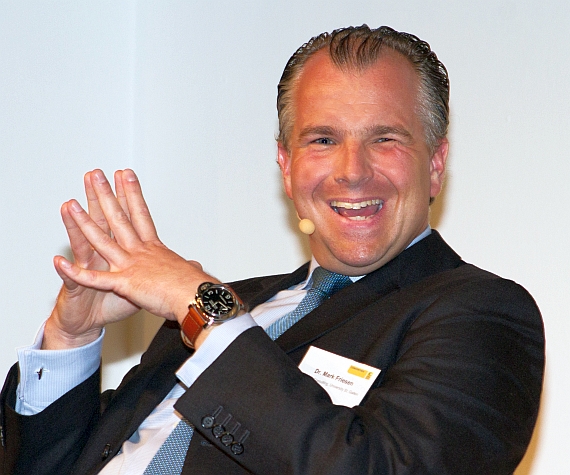 |
|
| Communicate price and value, recommends pricing expert Dr. Mark Friesen. |
Playful hotel websites drive guests directly into the arms of the OTAs, the host noted. Michael Buller of course saw that differently: The appeal of OTAs is there because these provide a benefit for the customer. Pyhan from Marriott agreed with this: OTAs provide selection, show services and USPs. A hotels doesn't manage this. "If they impress the guest in the hotel, then he comes directly back to us," he said to his colleagues. The VIR representative saw threatening clouds on the horizon though: Hoteliers see OTAs as competition, these should provide transparency, but hoteliers want to grab these bookings directly. "Hotels want simple business!" Buller noted, "we want equality of arms and fairness."
All discussion participants saw positive ratings as clear business driver, though Marriot's objection surprised: The US chain has determined that many customers would trust a neutral site such as TripAdvisor more than a hotel website such as marriott.com. Buller advised hoteliers to tell stories on Facebook, for instance, which would illustrate life in the hotel in order to give the customer security before the booking... That too would ultimately lead to higher prices.
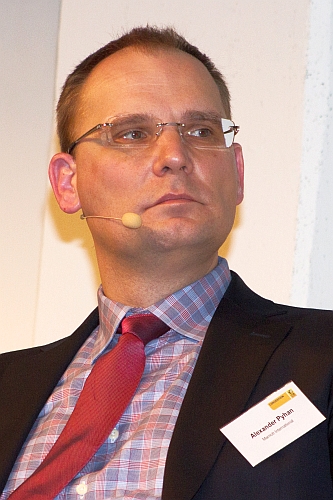 |
|
| Control the distribution channels, says Alexander Pyhan of Marriott Hotels. |
Roomkey is to be viewed as a means of bypassing the OTA. This young US portal was founded by five mega chains, including Marriott. Alexander Pyhan described the portal as a type of "exit" pool for customers who, after a failed search with the first company is then steered to its partners.
Meta-search engines are the new monsters
Will meta-search engines now get a major boost following the rate parity case? Buller: "Yes! These are the monsters which we now face. They create value and compare independently." He also forecasts that they would soon also become better in terms of value comparisons so that the customer would no longer have to wade through umpteen individual websites. For pricing expert Friese, this is the "Amazonisation" of the tourism value chain. Marriott too sees uses for the meta-search engines - because the customer doesn't
understand rate parity and because this indeed doesn't exist. Hotels always operated with different prices in different portals. "Those booking directly are punished," Alexander Pyhan said critically of his own sector. He summarised: It's no longer a matter of price, but of control of the third party distribution channels! "Price controlling will become a task for every brand hotel!"
It seems there isn't much time left for the hotel industry to act here. The huge rise in traffic volume on the Internet has now been followed by the mobile boom. And we're certainly not talking about price and price controlling here, but already about the art of linking customer data. / Maria Puetz-Willems
Continuative Links:
- April 4. 2014 Its no longer James Bond ITB Hospitality Day 2014 Keynote warns hotel sector about data attacks
- March 28, 2014 Chinese: Going local - ITB Hospitality Day 2014 revealed changes in Chinese travel behaviour
To print this article you have to be registered and logged in for newsletter, visitor or subscription.





